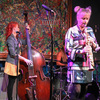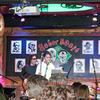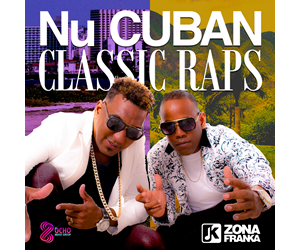Archivo
New Stuff[hide]
Reportes: From The St... : Jazz Plaza ...
Fotos: Tom Ehrlich : Irakere 50th Annivers...
Fotos: Tom Ehrlich : Irakere
Resenas: Joey Altruda Presents: El Gran ...
Reportes: From The St... : Cubadisco 2...
Timbapedia: 09. Interviews -... : Carlos del Pino ...
Fotos: Tom Ehrlich : 2023 Monterey Jazz Fe...
Fotos: Tom Ehrlich : 2023 Monterey Jazz Fe...
Fotos: Tom Ehrlich : 2023 Monterey Jazz Fe...
Fotos: Tom Ehrlich : 2023 Monterey Jazz Fe...
Grupos: Tirso Duarte
Grupos: Tirso Duarte : Discography
Grupos: Charanga Habaner... : 8. El bla bla bla
Grupos: Pupy y los que S... : Tirso Duarte
Photos of the Day [hide]
Sin Clave No Hay Na
Gotham Gets Her Groove Back, Part IV:
What Does This Mean For The Future? (First Half)
Article and Photos by Bill Tilford -- All Rights Reserved
The opinions that follow are my personal opinions and do not necessarily reflect the official opinions of TIMBA.com or of my colleagues.
The metropolitan New York area is being blessed with a lot of Cuban music - including Timba - these days, so the future looks bright from that angle. Gotham really does have her groove back! I saw some wonderful shows while visiting, and had I not been attending the Havana d'Primera shows and the BAM extravaganza, there were other options of some sort every night while I was there. This is great news for concertgoers but may prove to be a mixed blessing for presenters and venue operators. Case in point: There were four opportunities during the week to see Havana d'Primera and two additional chances to see Alexander Abreu individually in the BAM show. I attended all of the HdP performances, and although I noticed a few of the same individuals at more than one show, the audiences for each night were largely distinct. If all of the people who saw the HdP shows had been gathered together at one place, there probably would have been a couple of sold out shows (or at least one sold out show with a healthy crowd at the second one). As it is, the crowds were respectable for each show, but people understandably appear to have chosen the date and place that made the most sense to their circumstances. (Only the most hard-core enthusiast would take in four nights of any act.) On the other hand, it needs to be understood that reducing the number of shows would have almost certainly increased the price of the tickets, perhaps to a level that might have deterred some people from going due to the price. The Friday night BAM show that I saw was very well attended but was also not sold out. Even better, the audience enthusiasm was intense at all of these shows. I write this without knowledge of how any of these shows performed financially (it may take some time for that picture to become clear anyway), but I see two takeaways for future event planners: (A) there is a genuine demand for the music, and when new listeners hear it, they will love it, but (B) there will almost certainly be stiff competition to meet that demand in metro New York as the future unfolds, and it may take a stroke of luck for anyone to get a "monopoly" for any specific night; therefore, expectations regarding ticket sales will need to take that factor into account, and a high level of advance publicity will be critical to success in many cases.
Which brings us to the issue of ticket sales. I understand the reasons why past experiences have driven so many fans nationwide to postpone ticket purchases to the last possible moment (usually at the door), but in many cities including New York (and my hometown, Chicago, for that matter), this has turned into a game of "chicken" (in the original version, two cars race toward each other at high speed, and the first driver to turn away before a collision is the "chicken") between fans and concert presenters, and this is a game that the fans will ultimately lose if it continues. The overhead expenses of presenting a touring band from Cuba are enormous, the profit margins are slim on those occasions when one is made at all, and presenters that are cautious about not losing a lot of money use advance ticket sales to project whether they should proceed and how. I am seeing an increasing number of last minute cancellations across the country over time due to the absence of advanced ticket sales, and this problem will get worse rather than better if something doesn't change. SO:
Fans: You need to understand that when you say "I'll buy at the door" you are in effect telling the venue that you really aren't sure that you are interested. That might not be what you are trying to say, but it is what they will definitely hear. If you really do want to see a touring group from Cuba, the decision that you will need to make is whether you can trust that you'll get a refund if something does go wrong. If the answer to that question is "yes", and if the event is with an established venue rather than the local bingo hall (it usually will be), I would start buying in advance if I were you, or some venues will stop trying to host these acts.
Concert Presenters, Promoters, Agents and Venues: You need to understand that right now, there frequently aren't any real incentives for fans to purchase advance tickets, and you can see what's happening with your own eyes. If I were you, I would start structuring some kind of better incentives for advance purchases into the ticket price even if that means raising the amount for at-the-door sales, and I would stress those more boldly when publicizing the dates. Understand as well that this problem is also a powerful argument in favor of working with a supportive , established venue rather than renting a hall and relying solely on the credibility of your name as a promoter. Yes, this may add to your expense line, but it will also add to ticket sales. If you're lucky, that will compensate for the expense.
Everyone: Seriously, folks, work this thing out, or we will all see fewer concerts with bands from Cuba in the future even though it will become easier on paper for them to come to the United States and there are plenty of fans to go around. Wouldn't that be ironic?
Normally, when everything is going perfectly, promoters and agents aren't a visible part of the final story, and by way of introducing this subject, I need to share a couple of harsh realities about the music industry. The most important one is that if eligibility for sainthood were a requirement to be in the entertainment business, perhaps half of the concerts and recordings that have taken place over the years would never have occurred, and a high percentage of the disc jockeys now in the clubs wouldn't be working either. A certain amount of hype is part of how things frequently get done in most segments of the industry. The best operators keep that to a necessary minimum, and most never cross the line into blatant dishonesty, but this brings me to my second point. There are some first-class agencies which I will not name here that have the skill sets and the experience to manage our music well, but after looking at things from the perspectives of risk, time and expense vs. potential reward, they have frequently chosen to focus on more profitable (and less difficult) lines of business. This limits the pool of potential agencies for this music, and that calls for a certain level of public tolerance of those who can and will handle the music if they are essentially honest by music industry standards, reasonably competent and willing to learn from any mistakes that they do make (that very last item probably disqualifies some would-be promoters who otherwise meet the first two criteria. Most people in this business make mistakes now and then, the key is whether you can learn from them and improve.)
This brings us to the organizer/promoter for the Havana d'Primera , Mayito Rivera and Tirso Duarte concerts (but not the BAM performances), Jay Peña , who had also presented the Mega Timba Concert at the Copacabana earlier this year. Given the very mixed public reaction to that earlier event and the circumstances surrounding it, I was among those who were initially skeptical about whether he should be attempting another Timba concert series of that scale so soon afterwards. He chose to persevere, and I chose to give him the benefit of the doubt as he moved forward with plans for the second round of concerts. To his credit, he submitted himself to a level of scrutiny from some elements of the Timba community that most agents and promoters would have refused, and while he may have made a few decisions along the way that I would not have made personally, in the end, he presented some excellent concerts that might have been even better with fewer complications if not for circumstances beyond anyone's control (Superstorm Sandy being one of them). I do believe that working with a respected venue like S.O.B.s made a positive difference in this case, and having them or someone like them on board is (in my opinion) important to the success of future concerts. While I hope that Mr. Peña realizes that he still has some room for improvement in the public relations and traditional (such as press and radio) publicity departments, and I am quite sure there are some other lessons from his experiences that would not be appropriate to share here, I also think that he has clearly demonstrated that he is sensitive to the Timba community and can deliver concerts worth attending. (I for one am very happy with the concerts that he presented this time, and the audiences were very enthusiastic as well.) There are other agents and promoters in this business who have been far worse (and who have even sometimes crossed the line into blatant dishonesty) without experiencing this level of scrutiny from the public. If anything good comes from Mr. Peña's experience with running the gauntlet, perhaps it will be a signal to the less-reputable types in the business that the Timba community is watching more closely now. But I also counsel our community to be careful not to drive capable operators from the field by acting with excessive zeal in the name of being vigilant. The pool of available agencies and venues that can and will present these groups effectively is rather small, and we need to remember that as we go forward.
(...to be continued...)





















